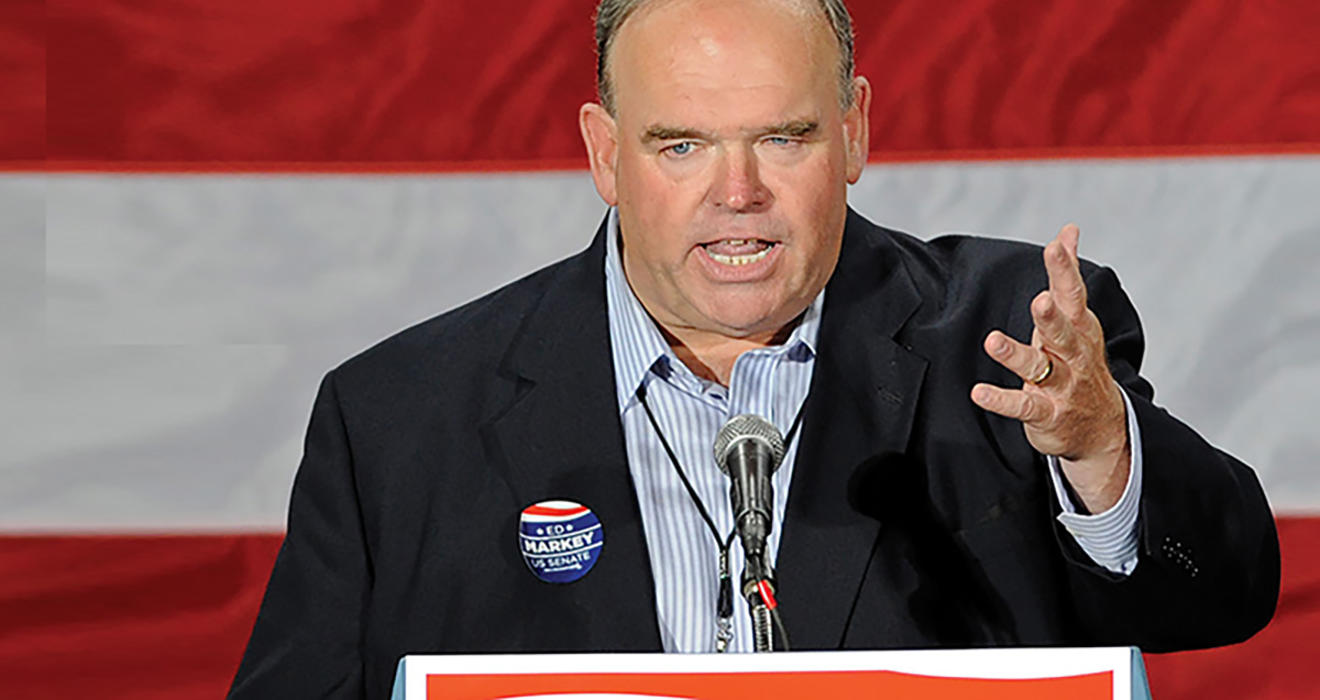
April 14, 1958 — Nov. 20, 2023
Before building a career as a nationally lauded political strategist, John E. Walsh ’80 learned with his roommate, Ephraim “Effie” Spielman ’80, the power of technology in advancing long-term, labor-intensive projects.
“We were both politics majors and it was before the rise of personal computers,” says Spielman, who was Walsh’s roommate for four years, “so we just spent many hours together at the old computer center inputting data on punch cards, including research for our junior papers and senior theses.”
Spielman credits that early adoption of data-driven technology, along with his friend’s “humility and great confidence in people,” as the building blocks that allowed Walsh to have an indelible mark on U.S. politics.
“He was the opposite of an elitist and would be utterly embarrassed by all this praise.”
— Ephraim “Effie” Spielman ’80
Walsh achieved what one obituary described as “cult hero status” in his home state of Massachusetts after managing the long-shot 2006 victory of Deval Patrick, the state’s first Black governor. As Massachusetts Democratic chair, Walsh next oversaw victories for Congress, attorney general, and down-ballot offices, including numerous women and people of color, always guided by what Spielman called his genius “bringing people together from different life experiences.”
Walsh also led the 2020 reelection of U.S. Sen. Edward Markey, who defeated Democratic primary challenger Congressman Joseph P. Kennedy III. Prior to that high-profile primary, no Kennedy family member had ever lost a Massachusetts election.
In these and other victories, Walsh pioneered relational organizing, a labor-intensive mode of voter contact that, instead of relying on high-dollar TV ads, leverages individual relationships, recognizing that people are more likely to support a candidate when asked by someone they know and trust.
Walsh’s grassroots model — which combined traditional one-on-one conversations with modern data-driven tools, including phone calls, text messages, and social media — has been widely imitated and became nationally ubiquitous when the 2020 COVID lockdowns made most in-person campaigning impossible.
“It sounds simple now,” Doug Rubin, Patrick’s 2006 campaign consultant, told Politico, “but back then the idea of using the internet and websites was revolutionary.”
David Plouffe credits Walsh’s organizing model as a template he utilized in 2008 as campaign manager for Barack Obama, who went on to become America’s first Black president. Obama himself wrote of Walsh, in a letter read by Patrick at a celebration of Walsh’s life in November: “His was an example of the kind of life and leadership we should all aspire to.”
Walsh’s historic victories were matched by an attribute exceedingly rare in politics — selflessness. “No ego, no gatekeeping, no hang-ups, just humble service,” said former colleague Samuel M. Gebru. “Just someone who treated everyone the same, whether you were a U.S. senator or a volunteer,” said Rubin.
Walsh was also known for his optimism, earning the nickname “Captain Sunshine” throughout Massachusetts.
A first-generation American whose parents immigrated from County Kerry and County Cork in Ireland, Walsh played freshman football at Princeton and wrote his senior thesis on the United Mine Workers, viewing his Princeton education as “a gift that he cherished throughout his life,” according to longtime friend Spielman.
The celebration of Walsh’s life was attended by more than 1,000 friends, family, and a who’s who of Massachusetts politics at Boston’s Faneuil Hall, often called the “Cradle of Liberty” because of its central role in the American Revolution.
“He was the opposite of an elitist and would be utterly embarrassed by all this praise,” Spielman says. “In everything he did, John was the ultimate team player and felt that his success resulted from teamwork that he was lucky enough to lead. He exemplified service to his community and country.”
Craig Varoga ’79 is a national Democratic political strategist and congressional and presidential studies fellow at American University.






No responses yet